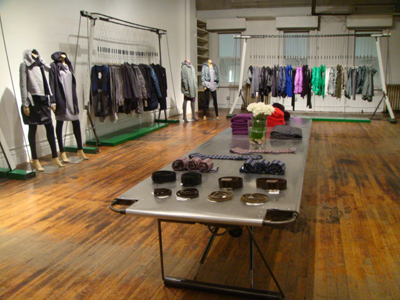Life and Leisure
Refashion made-in-China image
By Wu Chong
Updated: 2010-01-01 00:00
 |
Large Medium Small |

NEW YORK: The global recession is giving some privately owned Chinese companies an opportunity to establish their brands in the United States, most recently in the fashion industry.
In early December, Zhejiang-based privately owned Hangzhou JNBY Finery Co Ltd, which owns fashion brand JNBY (Just Natural Be Yourself), launched a pop-up store (a shop that only opens for a few days or weeks and then closes, often to cash in on a seasonal sales spike) in New York. This is the only mainland fashion label that has its own store in New York, if only temporarily, showing JNBY’s potential to follow Shanghai Tang and Port 1961 and become another made-in-China fashion brand well-known in the US.
Covering a space of abut 4,000 square feet, the JNBY store is hard to miss among other clothing shops in Soho because of its unique design — behind the display windows is a large screen wall that broadcasts live shows of its winter collections, and most of the clothes simply dangle on hanging rods.
The brand is about being “simple, natural and freestyle”, according to Gong Yi, the product manager of JNBY USA and a designer for the label.
JNBY plans to open another store, possibly a permanent one, in New York by the end of the year and expand to other US cities within three years, said Gong.
JNBY was created in 1994 and has had success in Asia and Europe, with registered assets of $10 million. The Soho pop-up store is its 18th overseas shop, but its first one in the United States.
In fall 2010, the company will launch its first wholesale business, targeting boutiques and department stores.
Gong said the label does not target a specific customer group. However, its prices — usually at least $250 for any given clothing item — places the brand in the medium-level market.
This marketing strategy faces challenges, according to Wu Juanjuan, assistant professor at the University of Minnesota’s department of design, housing & apparel.
“(That is) Combating Americans’ general impression of Chinese brands as being ‘cheap and low quality’,” Wu said.
“Chinese fashion brands might fare better if they compete for the low-end market,” added Wu.
The professor said the fashion industry in the US, as in France and Italy, long ago shifted from “clothes-making” to “image-making”.
“The core value that fashion brands offer, especially at the high-end, is their image, which their targeted consumers can identify with or can aspire to,” she said.
“Chinese fashion brands need to focus on building their image,” she said.
The US public’s current perception of “made-in-China” can certainly damage the image of a Chinese fashion label trying to break into the US, such as JNBY, but is a solvable problem, she added.
“The US fashion market is highly saturated but great potential still exists for innovative designs,” she added.
Gong and her colleagues are banking on their designs reaching that potential.
“Our clothes can be worn in different ways, either inversely or upside down. You don’t need to iron or fold them before putting them on. I think this really fits the lifestyle of this generation,” she said.
Katja Shuster, the wholesale manager of JNBY USA, said sales are good so far, but declined to reveal exact statistics or sales targets.
“Eventually we will look for advertising (to promote the label), but now we want to be exclusive and just by word of mouth,” she said.
US consumers will change their view of Chinese products as they use them more, Shuster added.
“The whole country is getting used to the fact that almost every garment, or one part of it, is made in China. So they’re really looking at the materials and they want something that makes them feel good. They don’t care much about where it comes from,” she said.